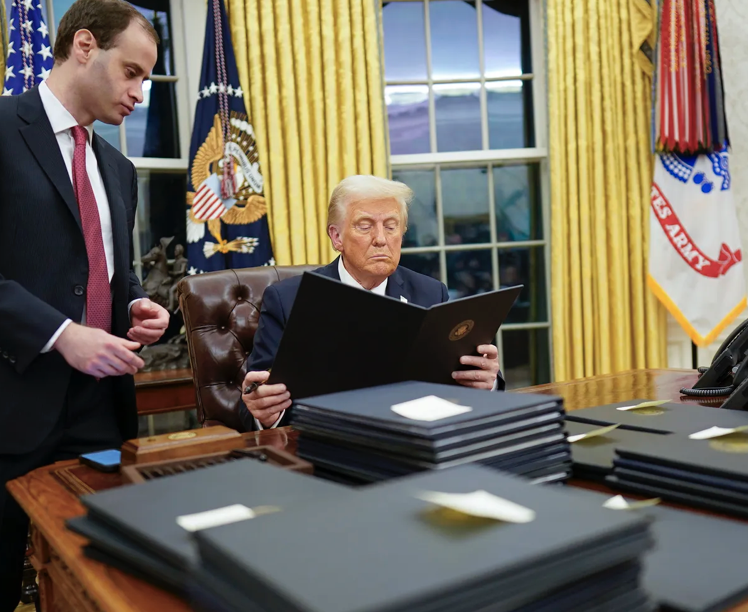By: George Will – washingtonpost.com – January 17, 2025
With his inauguration, Trump will commence achieving change unilaterally, without Congress.
When our first populist president, Andrew Jackson, claimed that his 1832 reelection constituted a broad mandate for his entire agenda, his nemesis Sen. Henry Clay demurred: “Sir, the truth is, that the reelection of the president proves as little an approbation by the people of all the opinions he may hold … as it would prove that if the president had a carbuncle … they meant, by reelecting him, to approve of his carbuncle.”
Make sense of the latest news and debates with our daily newsletter
Donald Trump, reelected, promises a flurry of transformative improvements to the nation, immediately (“on Day 1”), if not sooner. He has perhaps been rereading the Federalist Papers: “To reverse and undo what has been done by a predecessor, is very often considered by a successor as the best proof he can give of his own capacity and desert” (Alexander Hamilton, No. 72).
Four years ago, Casey Burgat of George Washington University and Matt Glassman of Georgetown University wrote in National Affairs that the presidency “changes more abruptly than other governing institutions.” A “strong disruptive incentive” grows stronger as presidents, impatiently disdaining Congress as an impediment to the flowering of their reputations, increasingly resort to achieving changes unilaterally, by executive orders.
Barack Obama unilaterally ratified the Paris Agreement on climate change as an “executive agreement” rather than achieving something — e.g., a treaty — affirmed by Congress. Trump unilaterally undid what Obama did.
On Inauguration Day 2021, Joe Biden’s 11-page enumeration of “Day One Executive Actions” included rejoining the Paris Agreement. And an executive order decreeing “a whole-of-government” initiative “rooting out systemic racism.” Trump’s executive orders can un-rejoin the Paris Agreement, and un-decree permeating government with racial calculations.
We are almost two centuries from Jackson’s invention of the theory of the plebiscitary presidency. It is: Because the entire nation votes for presidents, they are uniquely entitled to claim vast mandates. Today, Americans are inured to presidents’ finding large mandates in slender majorities. But remember this:
Since Ronald Reagan’s 58 percent of the popular vote in 1984, no president has received more than George H.W. Bush’s 53 percent in 1988. The numbers wizards at the Cook Political Report note that 2024 saw the popular vote decided by 229,766 (out of 155.2 million nationally) in Wisconsin, Michigan and Pennsylvania.
Granted, 229,766 is five times the 42,919 by which Joe Biden in 2020 won the decisive three — Arizona, Georgia, Wisconsin. In 2024 Texas (13.7 percentage points) and Florida (13.1) favored Trump almost as decisively as Kansas (16.1) did. Trump increased his support from 2020 in all 50 states and the District of Columbia.
Americans by the millions are rendering a mandate — albeit a negative one — as much with their feet as with their ballots. The mandate is in domestic migration from progressive states. Edward Pinto of the American Enterprise Institute notes that between 1990 and 2021 net migration subtracted 13 million residents from California, Illinois, Massachusetts, New Jersey and New York, and added 13 million to Arizona, Florida, Nevada, North Carolina, South Carolina, Tennessee and Texas. Entrepreneurial federalism — states competing for attractive economic and cultural climates — disfavors progressive policies.
At their peril, progressives disparage this as a “race to the bottom.” Particularly regarding their cultural aggressions, progressives should heed the late Daniel Patrick Moynihan, the four-term Democratic senator from New York: “Liberals have simply got to restrain their enthusiasm for civilizing others. It is their greatest weakness and ultimate disease.”
The greatest weakness of the U.S. government in the 21st century is the bipartisan embrace of executive strength — of unfettered presidents. Perhaps if 19th-century presidents had experienced the 21st-century exhilaration of governing by executive orders, Zachary Taylor would not have been so reluctant to become one.
In 1848, Taylor was at home on his Louisiana plantation when the Whig Party, unconcerned that he had no interest in politics and had never even voted, gave him its presidential nomination. From Joel Richard Paul’s “Indivisible: Daniel Webster and the Birth of American Nationalism”:
“When a letter from the Whig convention informing him of his nomination arrived postage due, he was such a tightwad that he refused to pay the postage. His nomination letter was sent to the dead-letter office. Weeks later, when they had not heard from him, the Whigs sent a follow-up letter, postage prepaid.”
He accepted the letter, and the nomination. Big mistakes. He died after less than 17 months in office, and about 15 decades before the fun of governing by executive orders.
To see this article in its entirety and to subscribe to others like it, please choose to read more.
Source: Opinion | Donald Trump has no mandate, but he does have executive orders – The Washington Post
 Listen Online
Listen Online Watch Online
Watch Online Find a Station in Your Area
Find a Station in Your Area








 Listen Now
Listen Now Watch Online
Watch Online
